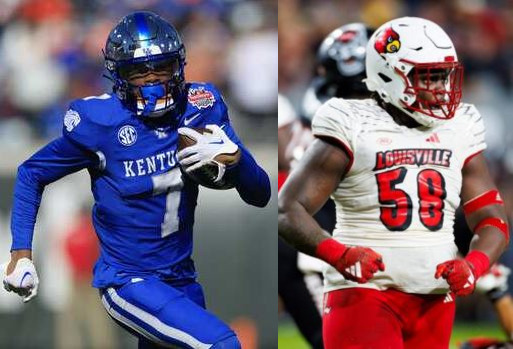
In Louisville, Kentucky, recent developments have seen the University of Louisville’s football team facing a series of departures as defensive linemen Jeffery Clark and Rodney McGraw have officially entered their names into the transfer portal, as reported by On3. The decision to transfer comes in the wake of the Cardinals’ loss to USC in the Holiday Bowl, marking the fifth instance of players opting for transfers after that particular game. The list includes linebacker Keith Brown, offensive tackle Vincent Lumia, and wide receiver Ahmari Huggins-Bruce. This brings the total number of scholarship players entering the transfer portal in the current cycle to 14.
Jeffery Clark and Rodney McGraw both arrived at Louisville as transfers during the previous offseason, each bringing a unique collegiate football background. Clark, having spent the initial four years of his college career at Georgia State, brought his experience and skills to the Cardinals. On the other hand, McGraw’s collegiate journey commenced at Penn State, where he played for his first two seasons before making the move to Louisville.
The trigger for these recent transfer decisions appears to be the culmination of the Cardinals’ 2023 season, which concluded with an overall record of 10-4, including a commendable 7-1 record in the ACC. Notably, the team secured a spot in the program’s inaugural ACC Championship Game, marking a milestone in its football history. However, the season concluded on a somewhat disappointing note, with the Cardinals experiencing a three-game losing streak under the leadership of head coach Jeff Brohm.
The timing of these transfers aligns with the commencement of college football’s 30-day winter transfer portal window on December 4. According to the current NCAA guidelines, players have until January 2, 2024, to enter the portal for a permitted one-time transfer. While both Clark and McGraw are now two-time transfers, they will enjoy immediate eligibility at their next destinations. This is a result of recent NCAA legislation, adopted earlier in the month, which allows multi-time transfers who make their move before the conclusion of the 2023-24 academic calendar to be immediately eligible for the next season.
The dynamics of college football are ever-evolving, and the transfer portal has become a significant aspect of player mobility and team restructuring. The decisions of Clark and McGraw, along with their teammates, highlight the fluidity of collegiate sports rosters and the impact of individual choices on team dynamics.
For the University of Louisville, these transfers present both challenges and opportunities. The departure of key players, including defensive linemen like Clark and McGraw, raises questions about the team’s defensive depth and strategy moving forward. On the flip side, it opens up opportunities for new talent to step into prominent roles and make their mark on the team.
Head coach Jeff Brohm will likely need to reassess the team’s defensive lineup and develop a strategy to fill the void left by Clark and McGraw. This involves evaluating existing talent within the team and potentially exploring options in the recruiting landscape to bolster the defensive unit.
The broader context of these transfers also invites scrutiny of the Cardinals’ overall team dynamics and the factors that may contribute to multiple players seeking new opportunities. The three-game losing streak at the end of the season could be a contributing factor, as players may be evaluating their prospects and seeking environments that align better with their goals and aspirations.
As the Cardinals navigate this transitional phase, the resilience and adaptability of the coaching staff will be critical. Successfully managing roster changes, integrating new talent, and maintaining team cohesion are ongoing challenges in the competitive landscape of college football.
Looking ahead, the University of Louisville football program faces a crucial period of reflection and strategic planning. The offseason provides an opportunity for the coaching staff to address any underlying issues, strengthen the team’s foundation, and prepare for the challenges and opportunities that the next season will inevitably bring.

In the ever-evolving world of college football, where rosters are dynamic, and player movement is a constant reality, programs must navigate these transitions with a forward-looking mindset. While departures like those of Clark and McGraw present immediate challenges, they also create space for growth, development, and the emergence of new leaders within the team. As the University of Louisville football program undergoes these changes, it remains to be seen how the team will evolve and position itself for success in the upcoming seasons.

Leave a Reply